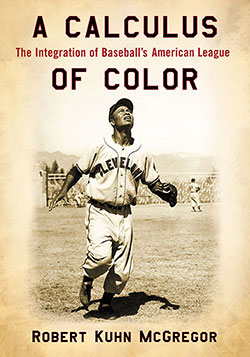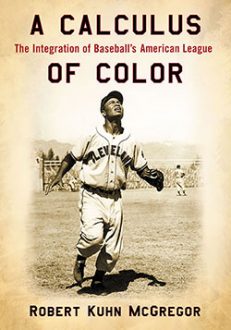A Calculus of Color
The Integration of Baseball’s American League
$29.95
In stock
About the Book
In 1947, as the integration of Major League Baseball began, the once-daring American League had grown reactionary, unwilling to confront postwar challenges—population shifts, labor issues and, above all, racial integration. The league had matured in the Jim Crow era, when northern cities responded to the Great Migration by restricting black access to housing, transportation, accommodations and entertainment, while blacks created their own institutions, including baseball’s Negro Leagues.
As the political climate changed and some major league teams realized the necessity of integration, the American League proved painfully reluctant. With the exception of the Cleveland Indians, integration was slow and often ineffective. This book examines the integration of baseball—widely viewed as a triumph—through the experiences of the American League and finds only a limited shift in racial values. The teams accepted few black players and made no effort to alter management structures, and organized baseball remained an institution governed by tradition-bound owners.
About the Author(s)
Bibliographic Details
Robert Kuhn McGregor
Format: softcover (7 x 10)
Pages: 224
Bibliographic Info: 19 photos, notes, bibliography, index
Copyright Date: 2015
pISBN: 978-0-7864-9440-8
eISBN: 978-1-4766-1868-5
Imprint: McFarland
Table of Contents
Acknowledgments ix
Preface 1
Introduction: The Costs of Racism 3
I. The Negro Leagues: Baseball by and for Black People 17
II. The American League: The Trials of a Major League 43
III. The Masks of Separation: Why Integration Was Unlikely to Happen 61
IV. A More Honest Face: How Integration Happened 82
V. The American League Tries: The Pioneer Experiments 99
Interlude. The End of The Road: The Negro Leagues Wither 128
VI. Reluctant Realists: A Change Gathers Momentum 135
VII. Ungracious Surrender: The Ongoing Resistance of the Final Two 162
VIII. Looking Back—and Looking Ahead 179
Chapter Notes 191
Bibliography 205
Index 211
Book Reviews & Awards
- A Library Journal Starred Review
- “His focus on the American League adds another dimension to the discussion of the integration of baseball…he raises important questions about the meaning of integration, particularly how it needed to go beyond the simple fact of having one or more black players on a roster…highly recommended” —Choice
- “The author slams a home run in dealing with racism in baseball and the larger picture of American life…McGregor’s account makes for a compelling read. A best sports book of 2015, and one that will stand the test of time.”—Library Journal;
- “A Calculus of Color should not only be required reading in every baseball history class, but every twentieth-century American history class…an outstanding piece of work…amazingly comprehensive…recommended”—Nine
- “Stands out amongst the extensive list of scholarship that covers early baseball, the Negro leagues, and desegregation. The tremendous detail, critical analysis, and humorous accessibility make a A Calculus of Color a must read for any sport historian interested in early twentieth century baseball.”—Sport in American History
- “A Calculus of Color does a stellar job of examining the integration of the American League, the rise and fall of the Negro leagues, and the implications of these changes on the social landscape of American society…should be used as a source for those who seek to gain a broader understanding of the ebbs and flows of professional baseball in the United States”—Journal of Sport History
- “A sweeping story of the racial integration of baseball, with a focus on the American League. A long-overdue achievement!”—Joseph Thomas Moore, author of Larry Doby: The Struggle of the American League’s First Black Player.






